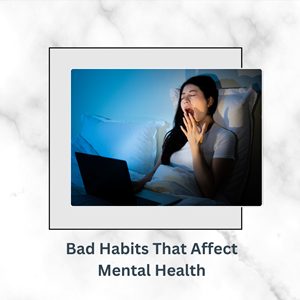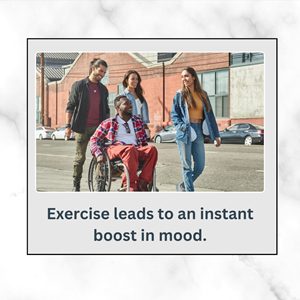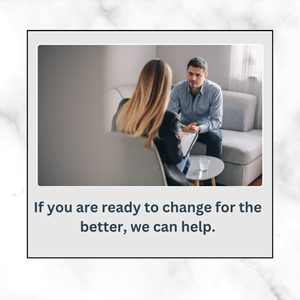Habits—bad ones especially—are sneaky. They take time to build, and during that process there are things that happen “behind the scenes” that reinforce their power. Bad habits that lead to us feeling better in the moment are especially powerful, and can be really hard to break.
Not all of these things listed are inherently “bad” when done in moderation. A sleepless night or a couple months of being busy are normal parts of life.
The key is to be honest with yourself and aware of where you are—what you’re doing and how you’re spending your time—and make the necessary adjustments, no judgment.
Here are some of the biggest habits that can negatively impact mental health.
Not Sleeping Enough

If you’re looking for a “magic pill,” this is it. Sleep is the closest thing we have to a cure-all, and is probably what most of us are lacking as we peruse the supplement aisle at the health food store, desperate to find something that helps us focus and feel less icky.
Sleep can become elusive when the schedule is packed and worries and stress abound.
If you’re having trouble sleeping, try taking a warm bath before bed. Then once you’re tucked in, listen to a guided sleep meditation. If your mind still insists on running wild with worry, let it. Just do your best to not attach to the thoughts. Let them drift along. Connect with your breath. Connect with the feeling of being snug in bed.
Escape
There’s no shortage of ways to escape. Whether it’s binge-watching series after series, scrolling social media for hours on end, shopping for things you don’t need, excessive exercise, getting way too wrapped up in work, or seeking comfort in food, there’s something for everyone.
Again, all of these things are perfectly acceptable in moderation. It’s when they consume your waking hours that it becomes problematic.
Do a little investigation: Which one are you particularly attached to? What’s missing in your life that you’re seeking comfort in through the behavior? What void is it filling, what feelings is it giving you that you’re not connected to in other parts of your life?
Are you looking for novelty and excitement? Are you seeking acceptance? Connection? Are you bored, or just generally lost?
Therapy is an excellent resource for self-reflection and a wonderfully supportive way to access answers to the deeper questions.
Alcohol & Cigarettes
Alcohol interferes with sleep, and can exacerbate anxiety and depression.
Cigarettes aren’t good for you, ever. We all know that.
These powerful substances are highly addictive. They lure many in by providing a short-term escape—at a price. At this point, everyone knows what the risks are, so no need to delve into that here. Just note that all of these have an adverse effect on mental health.
It’s counterintuitive: What we want—what we crave—is often not what we need.
Putting Yourself Last
Many of us were taught that in order to be considered nice people, we have to always do things for others and agree to what they want.
You’re tired? Too bad.
Your schedule is already full? Well, shift some things around.
You don’t like fish? Well, they do. Gag it down.
This is so deeply ingrained that for many of us, it’s really hard to put up boundaries or say no.
As a consequence, many are left with overwhelming schedules and perhaps just as damaging, this message gets reinforced: We don’t matter—our needs are less important than others.
A huge component of self-care is understanding realistically what you’re capable of in 24 hours, and not sacrificing yourself.
Prioritize sleep. Prioritize time with family. Say yes to the things that matter, but not at the detriment of your overall well-being.
Constant Overstimulation
Urban environments are extremely noisy and overstimulating yet many of us are so accustomed to it, we don’t even notice. We stop paying attention to the hundreds of advertisements, the chaos of the morning rush hour, the noise, the buildings, people, all of it. Processing that, even if a lot of it happens unconsciously, is exhausting and can be quite overwhelming.
This is another reason why meditation and spending time in nature is so profoundly impactful. It provides brief respite from the noise, allowing a moment to reconnect with your current state.
Unrealistic Expectations
Whether self-imposed, brought on by family, or just an expectation set by society. So many people tie their identity and self-worth to unrealistic arbitrary standards.
No one wants to live a life that pulls them away from who they are and what they authentically value and love, yet piece by pieces, bit by bit, that divide can grow. It’s tricky separating who you are from who you were told you should be, but it’s something everyone should do.
For many, stress, anxiety, and depression can be a warning sign, an indication that it’s time to look under the hood, so to speak, and in this analogy a therapist is just the mechanic you need.
A Sedentary Lifestyle
 Our bodies are designed to move, and there are so many ways to accomplish that. Find one that you enjoy, and make time for it. Exercise leads to an instant boost in mood. It reduces anxiety and depression and has so many other benefits.
Our bodies are designed to move, and there are so many ways to accomplish that. Find one that you enjoy, and make time for it. Exercise leads to an instant boost in mood. It reduces anxiety and depression and has so many other benefits.
The thing to remember is, you just have to do it. Even when you’re not in the mood.
Try this as an experiment: Next time you’re feeling anxious or low or just generally blah, do your favorite form of exercise, and check back in with how you’re feeling when you’re done.
Lack of Meaningful Relationships
Forming meaningful relationships as an adult is a challenge for many, and now we have smartphones in our hands. Further disrupting genuine connection.
One of the greatest joys and gifts in life is to have a deep connection with at least a few people. People who support you emotionally, love you unconditionally, and are there for you at the drop of a hat. People that delight in who you are, and you can talk about everything with.
This may sound cheesy, but it’s important to also cultivate that type of relationship with yourself. It’s tragic the amount of people who carry heavy internal burdens of crap that’s neither true, nor theirs to carry. This has a colossal impact on their wellbeing, and can put a huge damper on their enjoyment of life.
 If you’re struggling or looking for some extra guidance or support, therapy is an excellent resource. We offer counseling in Fair Oaks and Roseville, and are always happy to share more about how we can help.
If you’re struggling or looking for some extra guidance or support, therapy is an excellent resource. We offer counseling in Fair Oaks and Roseville, and are always happy to share more about how we can help.
Reach out through call or text when you get a moment, and know that when things feel overwhelming and hard, you’re not alone—there’s help out there.
Therapy in Roseville, CA, Fair Oaks, CA, or Online in California:
If you are ready to change for the better, we can help. Our therapists are ready to support you in your journey towards creating a healthy and happy lifestyle. To begin counseling in Roseville, CA area, or counseling in Fair Oaks, please follow these three simple steps:
- 1. Contact our counseling office to get more information about what therapy would be best for you and to schedule a free consultation.
- 2. Make an appointment with one of our highly trained therapists
- 3. Find support and healing in your life!
Services Offered at The Relationship Therapy Center in California:
Our Sacramento area counseling clinics located in Roseville, CA and Fair Oaks, CA are pleased to offer a variety of mental health services. Our services include but are not limited to: Couples counseling, counseling after infidelity, sex therapy, co-parent counseling, family therapy, divorce counseling, intensive couples retreats, and premarital counseling. Our individual therapy services include, anxiety treatment, therapy for children, teen therapy, depression treatment, and individual relationship counseling. We also offer online counseling to California residents. Please contact our office to learn more about the many ways we can help you and your loved ones.
